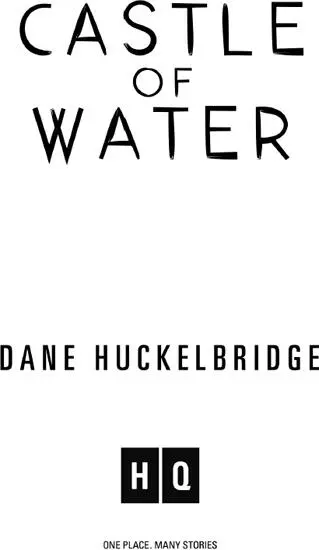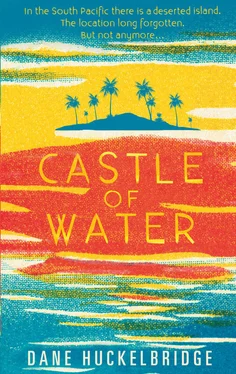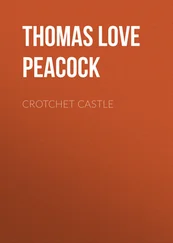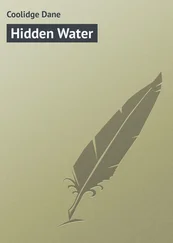DANE HUCKELBRIDGEwas born and raised in the American Middle West. He holds a degree from Princeton University, and his fiction and essays have appeared in a variety of journals, including Tin House , The New Delta Review , The Wall Street Journal , and The New Republic . Castle of Water is his first novel, although he has also authored two historical works on American whiskey and beer, respectively. He lives with his wife in Paris, France, and New York City.

To you, my love, my Piment d’Espelette.
Thank you.
The cyclone ends. The sun returns; the lofty
coconut trees lift up their plumes again; man
does likewise. The great anguish is over; joy
has returned; the sea smiles like a child.
—PAUL GAUGUIN
Moi je t’off rirai des perles de pluie
Venues de pays où il ne pleut pas.
Je creuserai la terre jusqu’après ma mort
Pour couvrir ton corps d’or et de lumière.
—JACQUES BREL
Contents
Cover
About the Author DANE HUCKELBRIDGE was born and raised in the American Middle West. He holds a degree from Princeton University, and his fiction and essays have appeared in a variety of journals, including Tin House , The New Delta Review , The Wall Street Journal , and The New Republic . Castle of Water is his first novel, although he has also authored two historical works on American whiskey and beer, respectively. He lives with his wife in Paris, France, and New York City.
Title page
Dedication To you, my love, my Piment d’Espelette. Thank you.
Epigraph The cyclone ends. The sun returns; the lofty coconut trees lift up their plumes again; man does likewise. The great anguish is over; joy has returned; the sea smiles like a child. —PAUL GAUGUIN Moi je t’off rirai des perles de pluie Venues de pays où il ne pleut pas. Je creuserai la terre jusqu’après ma mort Pour couvrir ton corps d’or et de lumière. —JACQUES BREL
Part One PART ONE
Chapter 1
Chapter 2
Chapter 3
Chapter 4
Chapter 5
Chapter 6
Chapter 7
Chapter 8
Chapter 9
Chapter 10
Chapter 11
Chapter 12
Chapter 13
Chapter 14
Chapter 15
Chapter 16
Chapter 17
Part Two
Chapter 18
Chapter 19
Chapter 20
Chapter 21
Chapter 22
Chapter 23
Chapter 24
Chapter 25
Chapter 26
Chapter 27
Chapter 28
Chapter 29
Chapter 30
Chapter 31
Part Three
Chapter 32
Chapter 33
Chapter 34
Chapter 35
Chapter 36
Chapter 37
Chapter 38
Chapter 39
Chapter 40
Chapter 41
Chapter 42
Chapter 43
Chapter 44
Chapter 45
Chapter 46
Chapter 47
Chapter 48
Acknowledgements
Copyright
PART ONE
1
The flat is in the tenth arrondissement of Paris, on a derelict street called Château d’Eau. To find it is simple: Just take a right at the arch, go down rue Saint-Denis, steer clear of the dog shit, and you cannot miss it. To find beauty in it, however, is a bit more daunting. The charms of the alley do exist, if one squints past the worn-out tabacs and disheveled filles de joie that ply their trades along its curbs. Fortunately, the man who lives there is accustomed to squinting and proud to call the place his home.
He wakes earlier than usual on this particular morning. He does not rise immediately but lies awake for a moment, savoring the stillness of the chill blue hour. Then, at last, he decides to get up. A splash of water on the face, a quick brushing of teeth, a puckering spit, and a satisfied gargle. He smiles at his scarred and bearded reflection—grayer, it seems, with each passing day.
Ablutions complete, it’s time to get dressed. First he slips on an old moth-hounded sweater, followed by corduroy trousers flecked with white paint. A Harris Tweed jacket is pulled from the closet, the elbows of which are worn down to fuzz. Oh, and shoes—can’t forget those. The man puts on argyle socks and scuffed leather brogans and tiptoes out of his bedroom door. He considers briefly leaving a note in the kitchen but doubts he’ll be gone long enough to even be missed. He does, however, pause at the end of the hallway, to press his ear to another door and give it a listen. Satisfied with the silence, he leaves the flat, padding delicately down the winding stairs, past the dim halos of hall lights conferred upon wallpaper, only to realize halfway down that he’s forgotten yet again to put in his contacts. Damnit. He trundles back up and plops them in without so much as a glimpse in the mirror. Then he leaves.
The man decides to have breakfast at a café in the neighborhood, and he sits outside despite the chill. Huddled in his chair, fingers laced around his coffee, he watches the city yawn back to life. The rising sun scrubs the indigo out of the air; the streets for once smell washed and clean. Shopkeepers are slowly raising their shutters, starch-crisp waiters are unstacking their chairs. Even the femmes de la nuit have called it a night. It’s all part of a timeless ritual, one of which he never tires.
The man finishes only one of his two tartines, perhaps because he is not very hungry, possibly because of something more. The untouched piece of toast is wrapped in a napkin and pocketed away for general safekeeping. He pays the waiter, slurps back the last of his coffee, and heads next door to a Turkish grocer. The door chimes and he vanishes inside, only to reemerge seconds later with a paper bag tucked under his arm. With his free hand he hails a taxi and asks to be taken to Père Lachaise.
The driver is a friendly West African named Noël. The melodies of his homeland pulse quietly through the radio. The man likes the music and asks the driver where it is from. Senegal, the driver says. The man settles back into his seat, absorbing the rhythms and enjoying the ride. He gazes out at the fountains etched in verdigris, and the monuments steeped in history, and the streets lined with cracked cobblestones. He clutches his paper bag both tightly and tenderly, as if it is a precious thing that someone might take. He closes his eyes and lets the light bleed through his eyelids, as marimbas hint at warmer climes.
The sun is still low but fully risen when the man arrives at the gates of Père Lachaise—which are, incidentally, in the process of being opened by a jumpsuited groundskeeper lame in one leg. Bonjour, Claude, the man says to the groundskeeper. Bonjour, monsieur, the groundskeeper replies. Also waiting beside the entrance is a quartet of American art students, smoking cigarettes and laughing to themselves. Unlike the man with the paper bag, they are young and have been up all night. In a burst of drunken enthusiasm, they decided to pay the famous cemetery a visit.
One of the Americans thinks he recognizes the man with the paper bag—he looks very familiar. The boy’s eyes bulge, the beard and the scars. Holy shit, he whispers, his unlit Lucky Strike tumbling from his lips. Is that who I think it is? His friends cast glances over their hunched shoulders. It is. To think, they came to see a dead rock star and instead happened upon a living legend. They titter among themselves, giddy just to be standing so close. They know he lives in Paris. And they’ve certainly heard all the stories. Should they follow him in? The groundskeeper stands aside and the man with the paper bag enters. They should, and they do.
Читать дальше











